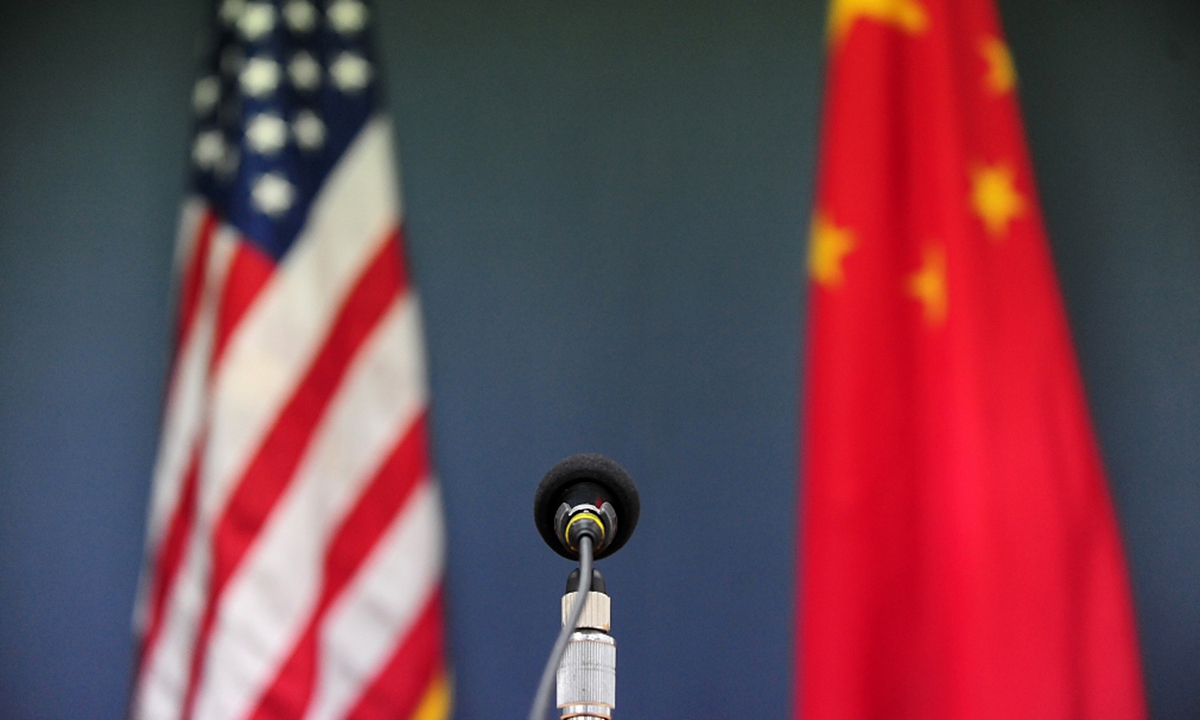Removing tariffs on Chinese goods 'conducive' to ameliorating US inflation: analysts
Biden officials caught between easing inflation, midterm elections

China US
China's stance on US' punitive tariffs is always clear: the duties imposed on Chinese goods should be removed to bring bilateral economic relations to normalcy. Also, eliminating the tariffs will help ameliorate inflation in the US, said analysts.
The US has started to re-evaluate tariffs on Chinese imports under the Section 301 investigations - about $300 billion - at a time when the US is witnessing runaway inflation and at the same time a possible recession.
The reassessment process is being conducted two months ahead of a deadline, an unusual move that shows the anxiety of the US government amid a contracting economy and surging inflation, analysts said.
As midterm elections loom, the Biden administration is stuck in a dilemma, Gao Lingyun, an expert at the Chinese Academy of Social Sciences in Beijing, told the Global Times on Wednesday.
"On the one hand, it is looking to score a point by removing the tariffs, which will be conducive to easing US inflation. But on the other hand, ending the tariffs would lead to skepticism about the administration's toughness toward China, and a softer stance may cause Biden to lose some political support at home," said Gao.
The US Consumer Price Index (CPI) rose 8.5 percent on a yearly basis in March, the highest since December 1981, well above the US central bank's 2 percent inflation target, according to figures released by the US Bureau of Labor Statistics on April 12.
The energy CPI rose 32.0 percent over the past year, and the food index increased 8.8 percent, the largest 12-month increase since May 1981.
Meanwhile, US GDP fell by annualized 1.4 percent in the first quarter, down from 6.9 percent rise in the fourth quarter in 2021.
There is a risk of stagflation for the US in the short term. The US needs to import a large amount of industrial and consumer goods from China to meet consumers' demand. The low prices of Chinese goods will, to some extent, help bring down the inflation in the US, Hu Qimu, chief research fellow at the Sinosteel Economic Research Institute, told the Global Times on Wednesday.
According to the Office of the US Trade Representative (USTR), it commenced on Tuesday the process for the four-year anniversaries of the tariff actions in the Section 301 investigation against China.
There were two actions effective in June and August 2018, respectively, which involved about $300 billion worth of Chinese goods.
The USTR said it will for the first step notify "representatives of domestic industries that benefit from the tariff actions of the possible termination of those actions and of the opportunity for the representatives to request continuation."
According to Gao, possible removal of the tariffs could be facilitated by American companies that are the victims of the hefty tariffs, rather than the USTR, as the Biden administration still wants to appear "not compromised from the outside."
Therefore, Gao said that it is likely that a decision on the tariff will be made after the midterm elections in November, and the launch of the review is a "testing of the waters" to gauge the attitude of the Chinese side.
Analysts suggested that channels for communication between the Chinese and US trade teams have been established, with both sides remaining in contact, and Beijing is open to trade talks as long as Washington shows sincerity.
But analysts also said that opinion is divided within the Biden administration.
"The US Treasury Department naturally wants to reduce inflationary pressure in the US by reducing tariffs on China. However, if the USTR removes the punitive duties, it seems to negate its previous work which will impact its political status, so it is opposed to cutting tariffs," said Hu.
According to Hu, the US Federal Reserve, which is independent of government agencies in making monetary policy, mainly looks at two indicators - non-farm payrolls and inflation.
The US non-farm sector employment remained strong in March, with 431,000 new jobs added.
"Therefore, considering that the inflation numbers are far above the target for the Fed, raising interest rates to combat inflation is now the Fed's priority," said Hu.
The Fed will announce its interest rate decision on Wednesday afternoon, US time. The market is expecting an increase of 50 basis point rise, which will be the second raise since 2018.
Meanwhile, US President Joe Biden is said to be planning to speak on economic growth, jobs and deficits on Wednesday.
"With the rising yields of US Treasury bonds, the US dollar keeps strengthening and the yuan depreciates against the dollar, which is not conducive to the expansion of US exports," said Hu.
Hu predicted that the US trade deficit with China is likely to widen further, due to the increasing downward pressure on China's imports.

